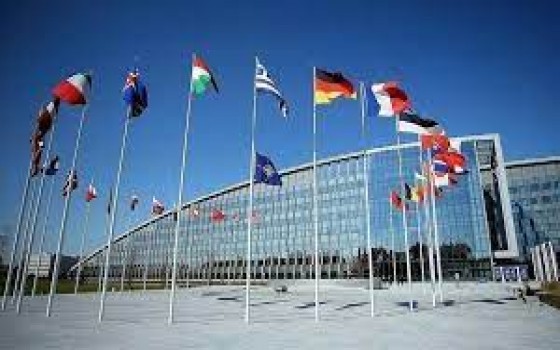
NATO Secretary General: It will be the shortest route to North America for Russian missiles and bombers over the North Pole

- Europe and Arabs
- Saturday , 27 August 2022 13:19 PM GMT
.Brussels: Europe and Arabs
NATO headquarters in Brussels published the text of the statement of Secretary General Jens Stoltenberg at a joint press conference with Canadian Prime Minister Justin Trudeau during a visit to a military base in the Canadian High North
My first visit ever to the Canadian High North. The High North is strategically important for Euro-Atlantic security. When Finland and Sweden join NATO, seven out of eight Arctic nations will be NATO members.
The shortest path to North America for Russian missiles and bombers would be over the North Pole. This makes NORAD's role vital for North America, and therefore also for NATO. As I saw for myself at the North Warning System radar site in Cambridge Bay yesterday. NATO’s new Strategic Concept identifies Russia’s capabilities in the High North as a strategic challenge for the whole Alliance.
Russia has set up a new Arctic Command. It has opened hundreds of new and former Soviet-era Arctic military sites, Including airfields and deep-water ports. Russia is also using the region as a test-bed for many of its novel weapon systems.
China is also expanding its reach. It has declared itself a “near Arctic” state, plans to build the world’s largest icebreaker, and is investing tens of billions of dollars in energy, infrastructure, and research projects in the High North. Beijing and Moscow have also pledged to intensify practical cooperation in the Arctic. This forms part of a deepening strategic partnership that challenges our values and interests.
Our response is a strong and predictable Allied presence in the region. We have already established a new NATO command for the Atlantic. Allies including Canada are also investing in new capabilities, and stepping up their presence in the High North. Allies regularly conduct Arctic exercises, including Canada’s Operation Nanook. And we met some of the participants in Nunavut yesterday.
Security challenges in the High North are exacerbated by climate change. Climate change will require us to transform fundamentally our approach to security and defence. And Canada has an unrivaled understanding of this.
So I welcomed yesterday’s briefings at the Canadian High Arctic Research Centre.
And I thank Canada for planning to host a NATO Centre of Excellence on Climate and Security, sharing expertise and best practice with Allies.
This, along with NORAD modernization, is one of Canada’s strongest contributions to our shared security.
You also lead NATO’s multinational forces in Latvia, helping to deter any aggression.
Your forces contribute to NATO’s training mission in Iraq, helping the Iraqis suppress terrorism.
Your Government plays a leading role in promoting our agenda for Women, Peace, and Security.
And Canada is a leader and a champion for NATO’s continued adaptation and innovation.
So I welcome your agreement to host a regional office of the NATO’s new defence innovation accelerator, DIANA.
Let me also thank Canada for its strong support to Ukraine.
Including with military equipment, financial and humanitarian aid, and training for Ukrainian soldiers.
And you have supported Ukraine for many years, and that makes a huge difference today.
And I also want to commend Canada for being the first to ratify the Accession Protocols for Finland and Sweden.
As NATO continues our adaptation and innovation, I know Canada will continue to be at the forefront.
Dear Justin, thank you once again.
And for being such a warm and generous host for our historic trip today and yesterday.
NATO will continue to increase our focus on the High North.
We will further strengthen our Alliance.
And we will continue to protect and defend our nations and our people.












No Comments Found